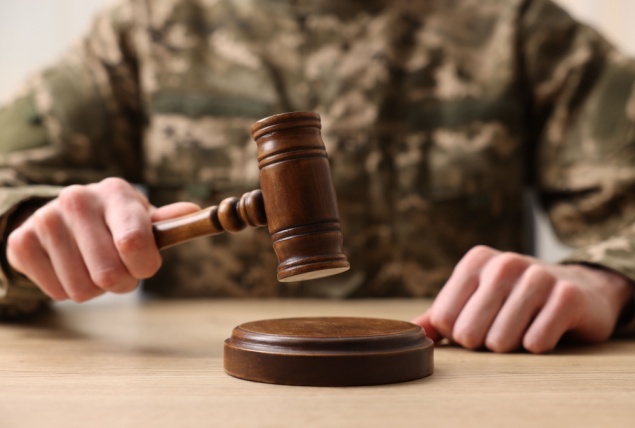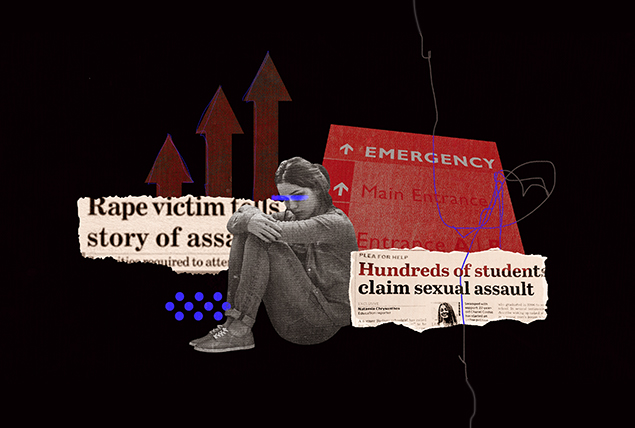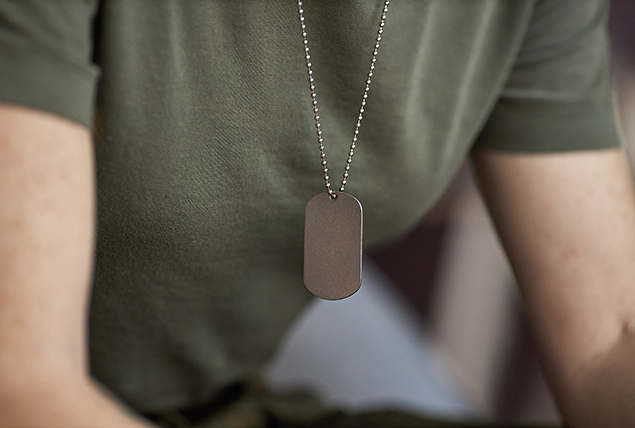Independent Lawyers Will Now Handle Military Sexual Assault Reports

Key Points
- Sexual harassment and assault are prevalent in the armed forces, affecting roughly one in four female soldiers.
- The new legislation takes cases for 13 types of military misconduct away from officials in survivors' chains of command, handing them over to military lawyers independent from the chain of command.
- Experts say it's a significant step in the right direction, but there is much more that needs to be done.
The connection between the military and posttraumatic stress disorder (PTSD) is widely recognized. Perhaps lesser known is the fact that many cases of service-related PTSD stem from sexual assault and not combat.
In response to rising sexual assault cases in the United States military and mounting pressure from Congress, the Department of Defense (DOD) in January announced it has instilled a new system designed to help survivors seek justice.
Independent military lawyers will prosecute sexual assaults and other serious crimes instead of commanders within survivors' units.
How many sexual assault and harassment cases are there in the military?
The military has taken multiple measures to improve service members' experiences, such as greater access to mental health counseling and the development of an Army tactical bra.
Yet members of marginalized communities continue to face distinct challenges and threats. For women, this includes a heightened vulnerability to sexual assault and harassment, according to a 2023 study published in Rand Health Quarterly.
In 2021, women made up around 17.3 percent of the active-duty force, according to the DOD. However, about one in four report experiencing sexual assault in the military and more than half report sexual harassment, according to a 2018 meta-analysis of 69 studies.
Sexual trauma can have profound repercussions on a person's health and quality of life, contributing to chronic conditions such as depression, PTSD and substance use disorder.
Additionally, research indicates a higher rate of female veterans getting hysterectomies than civilians, largely due to military sexual trauma (MST) and posttraumatic stress disorder.
Rates of sexual assault reports have persistently increased over the past decade. In 2021, the number of reported sexual assault and harassment incidents rose by 13 percent in the Air Force, 9 percent in the Navy and 3.6 percent in the Marine Corps, according to the Pentagon's Annual Report on Sexual Assault in the Military.
Although rates dropped 9 percent in the Army, there were still 8,942 reports across all branches.
These figures don't necessarily indicate that prevalence has increased but may suggest more survivors are reporting events.
At the same time, prosecution rates decreased precipitously, according to the report. In 2012, 68 percent of substantiated claims went to trial, compared to 37 percent in 2021.
The conviction rate in military sexual assault cases has also decreased, according to Military Times. In 2020, just 0.8 percent of sexual assault reports in the military ended in convictions under the Uniform Code of Military Justice, about one-third as many as in 2019.
At the same time, the number of administrative and non-judicial punishments has increased. In 2012, 18 percent and 15 percent of cases resulted in non-judicial punishment and administrative actions, respectively, compared to 35 and 28 percent in 2022.
Recommended
- PTSD May Affect Women in the Military Differently Than Men: Female service members are more likely to have PTSD. They also have distinct symptoms.
- How the Lavender Scare Shaped LGBTQIA+ Military Presence: A post–World War II culling demonstrated the country's larger attitude toward troops.
- The Facts About PTSD: Understanding this disorder is the first step toward learning how best to cope with post-traumatic stress syndrome.
Why is this change to military reform so important?
"One likely reason is that, previously, decisions were made by commanders who were ill-equipped to handle complex cases, such as sexual assault," said Colonel Don Christensen, attorney, former Chief Prosecutor for the United States Air Force and former president at Protect Our Defenders, based in Lorton, Virginia.
These commanders received advice from lawyers but were ultimately responsible for deciding whether to pursue or prosecute a case, Christensen said. Moreover, advising military lawyers frequently don't possess sufficient training and experience in sexual assault cases themselves.
"The law is complex, and sexual assault cases are particularly complex. Understanding all the variables that go into determining both the credibility of the victim and the defendant and the quality of the evidence is not something that should be made by people who are pilots, artillery officers or whatever else doing this as an additional duty," Christensen said. "It should be dedicated to prosecutors."
He added that because commanders were often unsuccessful when they did go to trial, they frequently looked for "easy ways out."
"They try to convince victims that you're better off if we give this guy administrative punishment and discharge him or [tell them] we can't win, don't go to trial," he said.
"There are also systemic issues in the rank and file and command structure. One is a 'culture of disbelief' regarding sex-related military misconduct. Another is that officials within the chain of command are subject to political pressures and conflicts of interest," Christensen said.
The latest legislation, passed by Congress and approved by the Biden administration in summer 2023, aims to address the latter of these issues. Now, a legal organization known as the Offices of Special Trial Counsel, consisting of independent judge advocates who report directly to the Secretaries of the Military Departments, will serve each branch.
This "landmark change" is the most significant reform to the military justice system since the creation of the Uniform Code of Military Justice in 1950, said Secretary of Defense Lloyd J. Austin III in a statement on December 28, 2023.
What crimes will the special trials counsel handle?
The special trial counsel will have the authority to prosecute 13 offenses, including domestic violence, child pornography, stalking, murder, manslaughter and most sexual misconduct, according to a U.S. Department of Defense news release.
Although most of these offenses are currently under the special trial counsel's jurisdiction, sexual harassment will become a covered offense on January 1, 2025, for crimes committed and reported after that date.
Despite being a step in the right direction, some critics have declared that this will not be enough.
"It's ridiculous, given the structural defectiveness of vesting prosecutorial discretion in a unit's commander over the members of her or his unit, that any crimes remain within command control," said Rachel VanLandingham, president emerita of the National Institute of Military Justice.
"The system is broken. If a commander can't be trusted with a murder case—which is a war crime if of a detainee during war—why allow a commander to decide desertion, which in some cases can carry the death penalty?" VanLandingham said.
What are some concerns regarding the new handling of military sexual assault cases?
"The reform, while imperfect, is a vast improvement," Christensen said.
Still, he and VanLandingham noted that much more needs to be done to serve survivors and address systemic issues within the military justice system.
"In 2023, there is simply no rational basis that American service members have a justice system that isn't equal to what civilians have—and that's either from the survivor perspective or the accused perspective," Christensen said. "But this is a continuing process."
Are the changes going to be enough?
"Significant education and training are necessary to remove the culture of disbelief that permeates the military about sexual coercion, harassment and other forms of sexual assault," VanLandingham said.
"Additionally, most military lawyers working for the special trial counsels will still lack sufficient training and experience to investigate and prosecute sex crimes," Christensen said.
One reason is that, under the current policy, prosecutors will only be allowed to remain in their position for three years—the usual policy for Judge Advocate General's (JAG) Corps members.
"I've prosecuted defendants for 23 years as a judge advocate. I know how important experience is, particularly when it comes to sexual assault and rape cases," Christensen said. "Experience is incredibly important in evaluating the case and presenting it effectively at trial, but it is not something that you become an expert at within three years and never do again."
For example, prosecutors would benefit from a knowledge of elements relevant to sexual assault, such as the freeze response to trauma, why many survivors are reluctant to report an attack immediately or how to handle a case with no third-party witness.
"I think a lot of us are nervous that the judge advocate generals and military leadership are not going to take it as seriously as they should to ensure this is working," Christensen said.
"I think there is an attitude of, 'Well, this is really no different. We're just going to do business as usual.' Business as usual is why this change was made—because Congress said that's not working," Christensen finished.
The bottom line
From the challenges of being an army mom to sexual harassment, many female soldiers have several hurdles to overcome their male colleagues are unlikely to ever experience. The new reform is evidence that the military is making significant efforts to enhance sexual assault prevention, accountability and justice.
If you or a loved one have experienced military sexual trauma, visit the U.S. Department of Veterans Affairs or National Sexual Violence Resource Center websites for lists of resources.


















